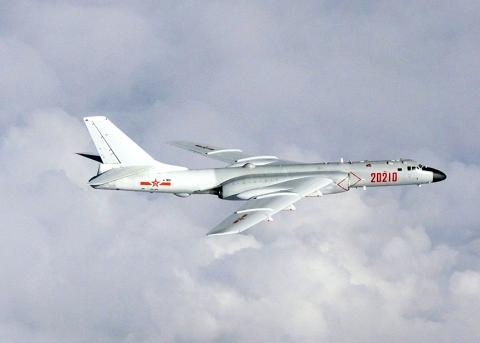China is destabilizing the Indo-Pacific region, US Secretary of Defense Mark Esper said yesterday, accusing Beijing of predatory economics, intellectual property theft and “weaponizing the global commons.”
The comments by Esper on his first overseas trip as secretary threaten to inflame already heightened tensions between Washington and Beijing as they are locked in an escalating trade dispute.
China’s increasing assertiveness, especially in the energy-rich South China Sea, has raised concerns within the region and the US is challenging Chinese maritime hegemony and seeking stronger ties with nations pushing back against Beijing.

Photo: EPA-EFE / Japanese Defense Ministry
“We firmly believe no one nation can or should dominate the Indo-Pacific and we are working alongside our allies and partners to address the region’s pressing security needs, Esper told reporters in Sydney.
“We also stand firmly against a disturbing pattern of aggressive behavior, destabilizing behavior from China. This includes weaponizing the global commons, using predatory economics and debt for sovereignty deals, and promoting state-sponsored theft of other nations’ intellectual property,” he said.
China has unnerved the region and angered the US by installing military equipment and other facilities on artificial islands it has built in the disputed South China Sea.
China claims large parts of the South China Sea through which about US$3.4 trillion in shipping passes each year.
Countries including Taiwan, Malaysia, the Philippines and Vietnam contest the territorial claims.
US Secretary of State Mike Pompeo on Friday decried “decades of bad behavior” from China that have hampered free trade, laying out a case at a Southeast Asian forum in Bangkok for Washington’s trade spat with Beijing.
US President Donald Trump on Thursday slapped 10 percent tariffs on US$300 billion in Chinese imports, stunning financial markets and ending a month-long trade truce.
China on Friday vowed to fight back.
Esper and Pompeo yesterday met with their Australian counterparts in Sydney at an annual security forum where the US and Australia pledged to strengthen opposition to Chinese activities in the Pacific.
The US and its Western allies worry that China is using foreign aid to secure greater influence over small Pacific countries, which control vast swathes of resource-rich ocean.
Australia, traditionally the major power in the South Pacific, has promised up to A$3 billion (US$2.04 billion) in grants and cheap loans to counter what Washington describes as China’s “payday loan diplomacy.”
“Cooperation with us and our Australian friends bring mutual benefits, not zeros, deals where one side wins and other risks losing,” said Pompeo in a thinly veiled criticism of China’s aid.

MORE VISITORS: The Tourism Administration said that it is seeing positive prospects in its efforts to expand the tourism market in North America and Europe Taiwan has been ranked as the cheapest place in the world to travel to this year, based on a list recommended by NerdWallet. The San Francisco-based personal finance company said that Taiwan topped the list of 16 nations it chose for budget travelers because US tourists do not need visas and travelers can easily have a good meal for less than US$10. A bus ride in Taipei costs just under US$0.50, while subway rides start at US$0.60, the firm said, adding that public transportation in Taiwan is easy to navigate. The firm also called Taiwan a “food lover’s paradise,” citing inexpensive breakfast stalls

TRADE: A mandatory declaration of origin for manufactured goods bound for the US is to take effect on May 7 to block China from exploiting Taiwan’s trade channels All products manufactured in Taiwan and exported to the US must include a signed declaration of origin starting on May 7, the Bureau of Foreign Trade announced yesterday. US President Donald Trump on April 2 imposed a 32 percent tariff on imports from Taiwan, but one week later announced a 90-day pause on its implementation. However, a universal 10 percent tariff was immediately applied to most imports from around the world. On April 12, the Trump administration further exempted computers, smartphones and semiconductors from the new tariffs. In response, President William Lai’s (賴清德) administration has introduced a series of countermeasures to support affected

CROSS-STRAIT: The vast majority of Taiwanese support maintaining the ‘status quo,’ while concern is rising about Beijing’s influence operations More than eight out of 10 Taiwanese reject Beijing’s “one country, two systems” framework for cross-strait relations, according to a survey released by the Mainland Affairs Council (MAC) on Thursday. The MAC’s latest quarterly survey found that 84.4 percent of respondents opposed Beijing’s “one country, two systems” formula for handling cross-strait relations — a figure consistent with past polling. Over the past three years, opposition to the framework has remained high, ranging from a low of 83.6 percent in April 2023 to a peak of 89.6 percent in April last year. In the most recent poll, 82.5 percent also rejected China’s

PLUGGING HOLES: The amendments would bring the legislation in line with systems found in other countries such as Japan and the US, Legislator Chen Kuan-ting said Democratic Progressive Party (DPP) Legislator Chen Kuan-ting (陳冠廷) has proposed amending national security legislation amid a spate of espionage cases. Potential gaps in security vetting procedures for personnel with access to sensitive information prompted him to propose the amendments, which would introduce changes to Article 14 of the Classified National Security Information Protection Act (國家機密保護法), Chen said yesterday. The proposal, which aims to enhance interagency vetting procedures and reduce the risk of classified information leaks, would establish a comprehensive security clearance system in Taiwan, he said. The amendment would require character and loyalty checks for civil servants and intelligence personnel prior to